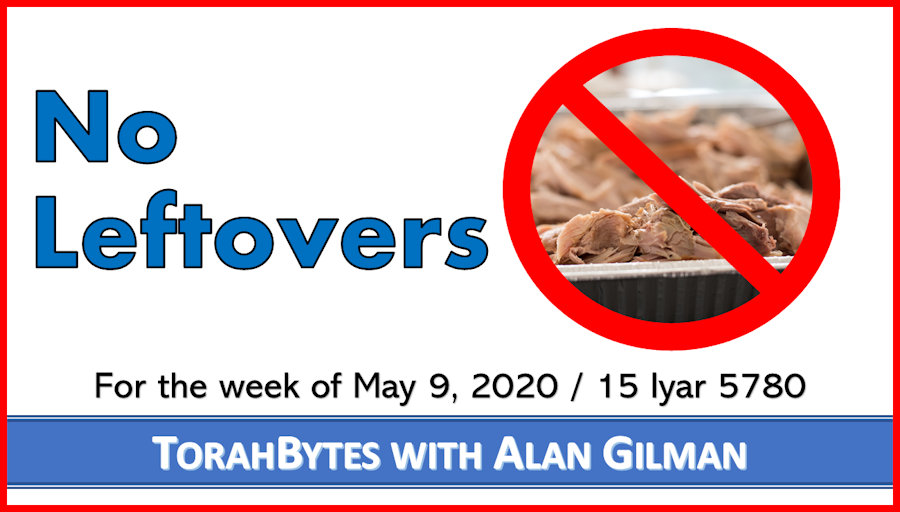For the week of May 9, 2020 / 15 Iyar 5780
Emor
Torah: Vayikra/Leviticus 21:1 – 24:23
Haftarah: Ezekiel 44:15-31
Download Audio [Right click link to download]
And when you sacrifice a sacrifice of thanksgiving to the LORD, you shall sacrifice it so that you may be accepted. It shall be eaten on the same day; you shall leave none of it until morning: I am the LORD. (Vayikra/Leviticus 22:29-30)
The regulations for the various Torah sacrifices are difficult for us to understand since we are not provided with all their whys and wherefores. I have the impression that sacrifice was deeply embedded within Israelite and non-Israelite cultures of the day before God gave the Torah. God’s directions through Moses therefore provide understanding and guidance for what they were already doing. Thus, it is a challenge to determine the purpose behind a directive such as we just read here. It’s impossible to know for sure why, in the case of thanksgiving sacrifices, God required they be eaten on the same day they are offered; no leftovers allowed.
In spite of the lack of explanation, we can see how following these instructions would affect the psyche of the people. Whether they could articulate it or not, they would develop an understanding of the nature of thanksgiving due to the ritual of thanksgiving established by God. First, thanksgiving was expected. To give thanks is an acknowledgment that the good things we have came to us from outside ourselves. This requires both thought and action. While gifts obviously come to us from outside ourselves, things that are the result of our labors may not be so obvious. When we work for something, we tend to think that the results we get are extensions of ourselves, not the blessing of God. But we don’t posses the kind of power that brings anything into existence. While we have our part to play, the positive results that emerge from our involvement are actually rooted in God, not self. Giving thanks to God, therefore, is an acknowledgement of this reality. Failure to do so is to deny the truth of how the universe works.
Practicing thanksgiving through sacrifice, not only acknowledges the truth of our being the recipient of God’s generosity, it is a tangible and public demonstration of that truth. Going through the ritual takes a concept of thanks and connects us, our family, and others to it. Remembering to say, “thank you,” is one thing, but to publicly give back to the giver in the sight of others expresses sincerity and encourages others to do the same.
I am aware that sincerity can be faked. Scripture is clear on the disgrace of pretending to honor God. As a result, we may be tempted to dismiss all forms of ritual, forgetting that being called out on hypocrisy doesn’t undermine ritual itself. Rather, it encourages us to engage ritual in the way it was intended, with sincerity.
Which brings us to God’s directive against having leftovers. Demanding that thanksgiving sacrifices were either to be consumed the same day as offered or burned up, made the offering exclusive to the purpose for which it was designed. The offering of thanksgiving was to have no other purpose. It was essential for the ritual to focus the attention of the person giving the offering. To allow leftovers reduced the intensity of the experience, thus diminishing the offering of thanks. Unless thanksgiving is focused, it is not the real thing.
In these days of COVID-19, it is important to take time to remember all the good things we have despite the challenges we are facing. But perhaps we need to do more than that. God is worthy of our focused attention. Maybe there are ways that we can offer sacrifices of thanksgiving by dedicating particular time, energy, and resources in an exclusive way. Remember, no leftovers!
Scriptures taken from the English Standard Version

